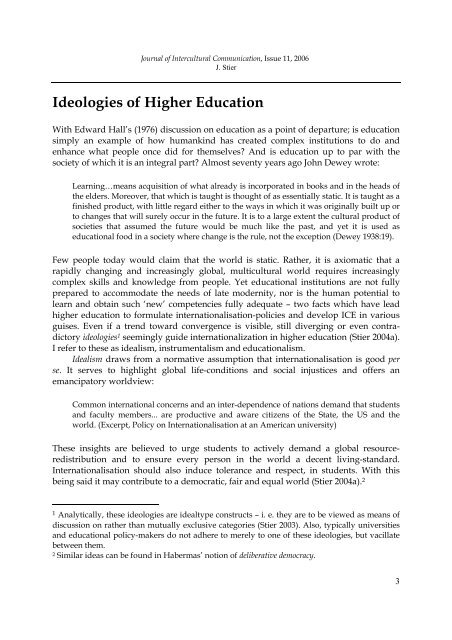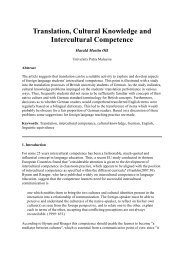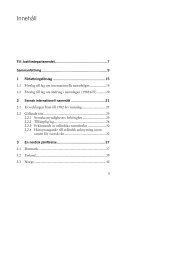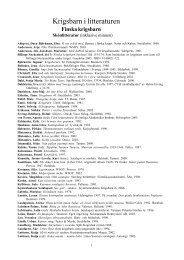Internationalisation, intercultural communication and intercultural ...
Internationalisation, intercultural communication and intercultural ...
Internationalisation, intercultural communication and intercultural ...
Create successful ePaper yourself
Turn your PDF publications into a flip-book with our unique Google optimized e-Paper software.
Journal of Intercultural Communication, Issue 11, 2006<br />
J. Stier<br />
Ideologies of Higher Education<br />
With Edward Hall’s (1976) discussion on education as a point of departure; is education<br />
simply an example of how humankind has created complex institutions to do <strong>and</strong><br />
enhance what people once did for themselves? And is education up to par with the<br />
society of which it is an integral part? Almost seventy years ago John Dewey wrote:<br />
Learning…means acquisition of what already is incorporated in books <strong>and</strong> in the heads of<br />
the elders. Moreover, that which is taught is thought of as essentially static. It is taught as a<br />
finished product, with little regard either to the ways in which it was originally built up or<br />
to changes that will surely occur in the future. It is to a large extent the cultural product of<br />
societies that assumed the future would be much like the past, <strong>and</strong> yet it is used as<br />
educational food in a society where change is the rule, not the exception (Dewey 1938:19).<br />
Few people today would claim that the world is static. Rather, it is axiomatic that a<br />
rapidly changing <strong>and</strong> increasingly global, multicultural world requires increasingly<br />
complex skills <strong>and</strong> knowledge from people. Yet educational institutions are not fully<br />
prepared to accommodate the needs of late modernity, nor is the human potential to<br />
learn <strong>and</strong> obtain such ‘new’ competencies fully adequate – two facts which have lead<br />
higher education to formulate internationalisation-policies <strong>and</strong> develop ICE in various<br />
guises. Even if a trend toward convergence is visible, still diverging or even contradictory<br />
ideologies 1 seemingly guide internationalization in higher education (Stier 2004a).<br />
I refer to these as idealism, instrumentalism <strong>and</strong> educationalism.<br />
Idealism draws from a normative assumption that internationalisation is good per<br />
se. It serves to highlight global life-conditions <strong>and</strong> social injustices <strong>and</strong> offers an<br />
emancipatory worldview:<br />
Common international concerns <strong>and</strong> an inter-dependence of nations dem<strong>and</strong> that students<br />
<strong>and</strong> faculty members... are productive <strong>and</strong> aware citizens of the State, the US <strong>and</strong> the<br />
world. (Excerpt, Policy on <strong>Internationalisation</strong> at an American university)<br />
These insights are believed to urge students to actively dem<strong>and</strong> a global resourceredistribution<br />
<strong>and</strong> to ensure every person in the world a decent living-st<strong>and</strong>ard.<br />
<strong>Internationalisation</strong> should also induce tolerance <strong>and</strong> respect, in students. With this<br />
being said it may contribute to a democratic, fair <strong>and</strong> equal world (Stier 2004a). 2<br />
1 Analytically, these ideologies are idealtype constructs – i. e. they are to be viewed as means of<br />
discussion on rather than mutually exclusive categories (Stier 2003). Also, typically universities<br />
<strong>and</strong> educational policy-makers do not adhere to merely to one of these ideologies, but vacillate<br />
between them.<br />
2 Similar ideas can be found in Habermas’ notion of deliberative democracy.<br />
3

















